Harry Potter and the Deathly Hallows has opened in England and assembled a stack of reviews, and is about to drop stateside on 11.19. Hundreds and hundreds of shows are sold out in advance. But step outside the Harry Potter church and no one cares. It’s one of the biggest cash cows in the history of motion picturts and nobody gives a toss.
Darn Gurus
The 11.10 Gurus of Gold chart has eight gurus predicting David Fincher will win the Best Director Oscar but only two of them saying that The Social Network will take the Oscar for Best Picture. They’re predicting, in short, a split decision with TKS getting the heart vote and Fincher getting the head vote plus the “okay, he’s earned it, he’s due” approval.
As a friend says, “The gurus always choose what they feel is the Best Picture emotional default film — the one that supposedly makes older viewers feel chest pangs. But they’re betraying themselves in the director category where many of them, including EW‘s Dave Karger, a totally political finger-to-the-wind consensus guy, have Fincher in the number one spot. That tells me a lot more than The King’s Speech in number one. The directors almost always lead the way.”
And you know what else may very well happen? The more people see The Fighter, the more you’re going to see it rise in the Best Picture ranks, and the more you’ll see David O. Russell elbowing into Best Director contention. The top five directors right now are Fincher, The King’s Speech‘s Tom Hooper, Black Swan‘s Darren Aronofsky, 127 Hours‘ Danny Boyle and Inception‘s Chris Nolan. But if The Fighter starts to catch on like I think it will, one of these five might begin to experience a little slippage.
After Hours
David Kaplan‘s Today’s Special (Reliance Mediaworks, 11.19) is a mild little foodie comedy that would like to be an Indian Tampopo. You’d think that a film based on an Obie Award-winning stage play (i.e., Sakina’s Restaurant, written by the film’s star and cowriter Aasif Mandvi) might have a certain quality of refinement, but all it delivers is a kind of innocuous likableness, largely due to Mandvi’s performance (he has presence, a certain gravity) and an appealing older actor named Naseeruddin Shah.
Otherwise Today’s Special doesn’t have the chops or the style or that extra X-factor that might lift it up and over.
There’s one profoundly irritating scene in Today’s Special that I have to at least mention. Aasif, a Manhattan-based sous chef stuck running his father’s Indian food restaurant in Queens, is shown pedaling his bike down a crowded Queens boulevard. Several large bags of Indian take-out are crammed into the basket. Suddenly he spots Jess Weixler (Alexander the Last), whom he knows from his previous job and would like to get down with. And right away I began muttering to myself “please…please don’t crash the bike and spill the take-out food on the street because you’re so distracted by the sight of Weixler….please don’t do that…I’m begging you…please, PLEASE” — and that’s exactly what he does.
As soon as this happened I said to myself, “Okay, that’s it — I don’t respect Mandvi any more, I don’t want these two to get together, I don’t want to watch this film…I’m out.”
But the party for Today’s Special, which I attended the night before last, was brilliant.
It was held in a private residence (the home of Noelle Twiggs, founder of a health-food website called Green Lemonade) on Soho’s Greene Street. The guests were seated on both sides of two long banquet tables adorned with candelabras, and with red Indian-style fabric hanging on the walls. Magnificent Indian food was prepared and served by chefs Akhtar Nawab (La Esquina), Kevin Patricio (Blue Hill) and Michael Hebb (One Pot). And Siddharta Khosla (of the band Goldspot) sang three songs for an after-dinner entertainment.
I attended the Today’s Special party (which meant blowing off a dinner with The Fighter‘s David O. Russell and Mark Wahlberg) because I wanted to chat with Weixler, whom I’ve taken a mild shine to, and maybe snap a couple of photos. I’d tried to arrange an interview earlier in the day but the obstructions from 42West and Weixler’s Baker Winokur Ryder reps were too much for me to handle. (They said I could do an hour-long phoner but not a half-hour long in-person chat, despite my willingness to meet near her Brooklyn home.)
So I found it strange that after all the problems in not getting this interview that I went to the party and hung out the entire night near the front of the room, adjacent to the kitchen area, with the idea of catching Weixler’s eye and taking a shot or two, and I never even saw her. No publicist said word one to me all night about where she was sitting, or offered to introduce or anything along those lines. Weixler must have slipped in very stealthily, apparently, or stealthily, at least, as far as I was concerned, and stayed in her seat. The room was candle-lit and on the dark side, as mentioned, and everyone was sitting at the two long tables but…well, it was just weird.
So the food was sublime and everyone was charming and helpful, but I’m trying to think of the last time I went to a party with the express intent of speaking with an actress and not even seeing her or her reps the whole night. It was like some kind of bizarre avoidance game that everyone was in on except me. And to think I could have avoided this whole charade and hung out with Wahlberg and Russell uptown.
Weixler sent a note the next day by way of BWR. It said thanks for saying “such lovely things about me” and that she was “sorry our schedules didn’t work out,” etc. And that’s fine. She’s cool. But those publicists, I’m telling you, were playing an odd game.
Descendants Seen
HE reader “Webster” (i.e., the guy who recently gave an A-minus to How Do You Know and said Paul Rudd is the standout) caught a 10.26 research screening in Pasadena of Alexander Payne‘s The Descendants. And he says it “traverses that fine line between comedy and drama without a hitch.
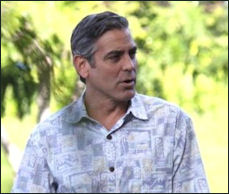
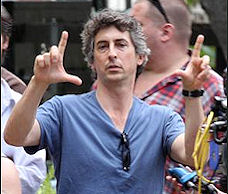
The Descendants star George Clooney (l.), director/co-writer Alexander Payne (r.) during shooting in Hawaii last March.
“George Clooney anchors the film as a man whose obligations to his daughters, his dying wife, his family, and even the state of Hawaii all come into play against a backdrop of infidelity, envy and greed,” he writes. “And a good ensemble cast supports him, although there’s no career-changing performance a la Thomas Haden Church in Sideways. All in all, it’s an entirely worthy addition to the Payne canon.
“Fox Searchlight obviously has its hands full with 127 Hours and Black Swan to awards season, but it clearly has a leg up on the competition with this one for 2011, along with Terrence Malick‘s The Tree of Life.”
It’s widely presumed that prior to its 5.27.11 opening, Malick’s film will premiere a couple of weeks earlier at the Cannes Film Festival. And to hear it from Deadline‘s Pete Hammond, The Descendants “may also be headed to the South of France.
“I ran into one of that film’s key players [at the Black Swan AFIFest showing] who said he had heard of ‘a Cannes plan just a couple of days ago,'” Hammond wrote. “If the Cannes berth does happen I’m told The Descendants domestic release would still be held until around this time next fall for maximum Oscar potential. In other words you can place your bets now that we’ll probably see it opening or closing the 2011 AFI Fest.”
A boilerplate Fox Searchlight/IMDB synopsis reads as follows: “Matt King (Clooney) is an indifferent husband and father of two girls forced to re-examine his past and embrace his future when his wife (presumably Judy Greer) suffers a boating accident off of Waikiki. The event leads to a rapprochement with his young daughters while Matt wrestles with a decision to sell the family’s land handed down from Hawaiian royalty and missionaries.”
The Descendants costars include Matthew Lillard, Beau Bridges, Shailene Woodley, Robert Forster and Michael Ontkean. Ontkean, best known for his roles in Slap Shot (’77) and Making Love (’82), hasn’t been in a theatrical feature of any distinction since Postcards From The Edge (’90). He’s been working on TV ever since.
Here’s an interview about The Descendants that Payne gave last summer to the Omaha World-Herald‘s Bob Fischbach.
Push
“It really is amazing that any movie not shot in front of a green screen ever gets made in this town.” — Deadline‘s Pete Hammond in his 11.12 piece about the AFIFest closing-night showing of Black Swan.
The Road
This q & a between Deadline‘s Mike Fleming and The Fighter‘s producer-star Mark Wahlberg went up Wednesday night…right by me. I didn’t read it Thursday because I wanted to see the film first, and of course I went that night. Yesterday it took me all day to tap out my Fighter review. This morning I finally paid attention, and I’m glad I did because now it all fits together.

Deadline‘s Mike Fleming: “When you first sign on, Darren Aronofsky is directing you and Matt Damon. Then Matt steps out but no problem, you’ve got Brad Pitt negotiating. Then Aronofsky leaves to make The Wrestler, and Pitt leaves to make Inglorious Basterds. And you’re left behind. When did you most fear that this movie wasn’t going to happen?”
The Fighter‘s Mark Wahlberg: “I really couldn’t look at it like that. I’d already told Micky Ward that we were going to get it done, and I was getting three or four phone calls a week from him. I knew it meant everything to him, and to Dickie Eklund, to have their story told. This movie had to get made. So I had to figure [it] out.
“At Paramount, they had a certain idea of how they wanted the movie to be made, the filmmaker, the costar and the budget. We went down the road with a couple other people and it didn’t work out. I went to the studio and said, I think I can figure out a way to get this movie done. Can you let me take for a little while, and then bring it back to you? They entrusted me with that. I thought I had figured out a way to make the best possible version of this movie and I was able to go and get that done.
Fleming: “Was this the most adversity you’d experienced in getting a movie to happen?
Wahlberg: “By far. I’ve never had anything like this. I hope I never have to go through anything like this again, even though the results were extremely positive. It was nerve wracking, physically and mentally exhausting, right down to the final hours. But that’s symbolic of who Micky was, the guy who never gave up, who never quit. Playing him, I literally got into that head space. I’m like that anyway. I’d never be in the position I’m in if my attitude had been, if it happens, great and if it doesn’t, okay. I’m not one of those guys where they just opened the gate and said, come in and do whatever you want.”
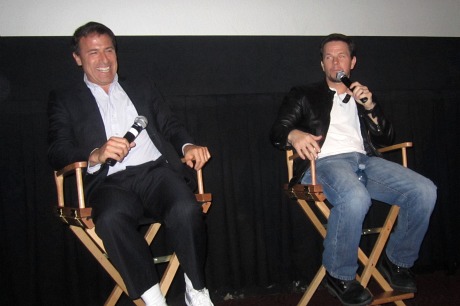
(l.) The Fighter director David O. Russell, (r.) Mark Wahlberg following Thursday night’s screening at Manhattan’s Lincoln Square.
Fleming: “The Fighter went from a $50 million Paramount picture to an independent that cost around $20 million, even though it’s still distributed by Paramount. I’ve heard you gambled most of your salary on the upside. When you work hard to establish a quote, what goes through your mind when you consider taking a big cut to get a picture made?”
Wahlberg: “This wasn’t hard at all. If you make those kinds of sacrifices for a good movie, all that other stuff will continue to be there for you. I’m more nervous about taking a big salary on a big-budget movie where, if it doesn’t succeed, you’re in big trouble because you take all that weight for its failure. I believed in this movie, that it was an amazing story that could inspire people. I thought those guys were so heroic. And I’d given my word and I didn’t want to be that guy who said, hey, we’re doing something, and then not.
“But I’ll tell you, I’ve learned not to count my chickens before they hatch. You have no idea. This movie was pretty much a go, back at the beginning. So I’m at a junket and when they ask what’s next, I say I’m going to do The Fighter with so and so. Then, you’re promoting the next movie and the question is, so when are you doing The Fighter? And you’re just like, oh, no. You say, we didn’t do it yet, but we’re going to get it done. And then it became this ongoing joke. Every time I promoted a movie, I’d see someone else I’d talked to the movie about with such enthusiasm. Now, I don’t like to talk about things until I’m on the set.”
Fleming: “When your picture is on the ropes, almost knocked out, how symbolically important was it for you to keep training? Would it have been conceding defeat?
Wahlberg: “Yes, for sure. And from a practical standpoint, if you work out for two years and then you don’t do it again for six months, you’re back to square one. It’s not like riding a bike, where you get right back on it. That training process was as expensive as it was time consuming. It wasn’t like somebody else was footing the bill. I was dragging these guys around with me, everywhere we went, putting them up in apartments when I was in different cities, on different locations, making films and promoting films. There were times we were so desperate to make the movie that we almost made the wrong version of the movie.
“For whatever reason, we were protected. I was able to get David O Russell. After spending a lot of time with David, I just thought he could make a version of this movie we hadn’t been looking to make before. It would still be very real, but it would have more heart, humor and emotion.”
Fighter Takes Manhattan
SPOILER-FREE: I’m sorry if I sound overly effusive these days, but David O. Russell‘s The Fighter is a real wow — a robust and feisty drama about a tough climb to a championship and success by the real-life, now-retired welterweight boxer Mickey Ward (Mark Wahlberg), and about his no b.s., slightly zaftig girlfriend (Amy Adams) and his drug-addicted, serious-jerkoff older brother (Christian Bale). I could put it all kinds of ways but the simple fact is that The Fighter is alive, really alive.
It’s a rugged little blue-collar thing that (I know this sounds like a cliche) pulses with grit and real feeling and emotional immediacy. It’s loose and crafty with a hurried, shot-on-the-fly quality. Which makes it feel appropriately “small” and local-feeling. To watch it is to be in it.
Hollywood has made good films about Massachusetts blue-collar people, but for me they felt “acted” (like The Town and, no offense, The Departed). But Russell and Wahlberg, shooting almost entirely in Lowell on a fast 33-day schedule, have made some kind of real-deal thing here. And the cinematography by Hoyte van Hoytema (Let The Right One In) is brilliant — it feels close and true as it bobs and weaves and circles like a boxer And the soundtrack is full of great music, ’60s and ’70s pop tracks and lots of newer-sounding, heavy-percussion stuff, and it all just seems perfect for the task at hand. In this sense The Fighter is almost like Hal Ashby‘s Coming Home with one right-sounding cut after another playing like a juke box in a diner.
Ten minutes into last night’s screening and I was saying, “Wait…this is good…this is good…this feels right.” The acting is great from every player, especially from Bale (he’s got the big showy part) but also Wahlberg, Adams (who’s finally gotten rid off that goody two-shoes thing she’s been saddled with from her performances in Junebug and Enchanted) and fierce Melissa Leo as the headstrong mother of Walhlberg, Bale and five or six of the gruntiest-looking family of blue-collar sisters you’ve ever seen in your life, let alone a film — they all look like they’ve been eating chili dogs and McDonald’s fries and knocking back shots of Jack Daniels since they were ten. And George Ward and several others are also on it. They all say what they mean and mean what they say, dammit. Nobody’s playin’ fuckin’ games here.
I know I seem to be having kittens over every other film I see these days, but distributors always hold the good stuff back until the end of the year and then wham…a deluge. So it’s almost been one enthusiasm binge after another, and I’ve been thinking it might be fun to dislike or even hate something again, or at least be slightly bored with it. Because it’s very tiring and repetitive to express love and admiration all the time. It can certainly feel that way.
This was my train of thought as I sat down last night to watch The Fighter. I’d read all the exciting notices from Tuesday night’s AFIFest screening in Los Angeles, of course, but I was still ready to possibly go in the direction of Variety‘s Peter Debruge and say “not bad here and there but basically naaah.” Or to parrot Indiewire‘s Anne Thompson when she said that “if all goes right for The Fighter (i.e., reviews/box office/critics and guild prizes), it’s possible” it could become one of the ten Best Picture nominees.
Thompson meant that the film faces political hurdles due to Russell’s shouter rep, but the word “possible” sounded unenthusiastic in a general sense. People would certainly look at her very oddly if she were to write that The Social Network or The King’s Speech are “possible” contenders, after all. She knows what she’s saying.
Well, let me explain something. The Fighter is not a “possible” Best Picture nominee. It’s a lock for it, and if this doesn’t happen something is really and emphatically wrong with the Academy membership because I swear this movie has the same tone of authenticity that On The Waterfront did when it first came out in ’54. Or more so, now that I think of it.
You know you’re seeing performances and a story worked on by several screenwriters and all that, but it feels as honest and as true as this sort of thing can be. Wahlberg has been trying to get this film made for four-plus years, but it feels as if came out in one big rush, and credit for that tone and that atmosphere obviously goes to Russell.
And Debruge, who has called The Fighter “confused” and “kind of a mess” is, no offense…oh, I don’t know what his particular blockage may or may not be but all I can say is that none are so blind as those who will not see. He just can’t get it for whatever reason and that’s fine, but eff him besides. I really couldn’t understand how a movie about a boxer could possibly add something to the table that I hadn’t seen before in 20 or 30 other boxing movies, but The Fighter‘s focus on family feuds and crack addiction and delusion and the necessity of facing brutal truths and looking people you love in the eye and telling them they’re history unless they clean up their act…this is what real families do, and why this movie feels like it’s doing it plain and straight every step of the way.
Film & Performance Of The Year?
SPOILER-FREE: Awards Daily‘s Sasha Stone has completely creamed and melted and gone purry like a cat over Darren Aronofsky‘s Black Swan and Natalie Portman‘s lead performance. Plus she thinks it won’t have a problem with women voters any more than it will with men voters. “If it’s too extreme for them they won’t vote for it,” she writes, “but what a great fucking movie.”

Folderol
I’d like to buy Nicolas Cage in a historical context, but I can’t. He can only portray present-day wackazoids. I realize that Cage has been making films hand over fist in order to pull himself out of a financial abyss, but there needs to be limits. The second I saw Ron Perlman , I went, “Okay, I know what this thing is.”
Season of the Witch is obviously CG porn. The more they pile on the visual effects, the worse films like this seem. The landscapes in this trailer are somewhat less convincing than those in Disney’s Snow White and the Seven Dwarfs (1937). Some look worse than those swirling sand-cyclone effects in The Mummy.
Zebra Legs
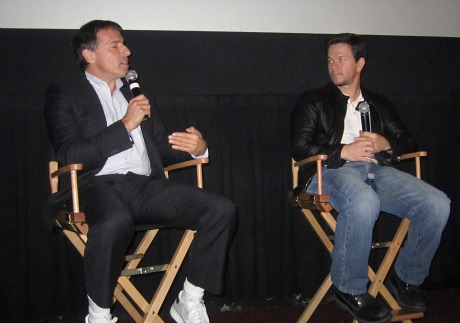
The Fighter director David O.Russell, producer-star Mark Wahlberg following last night’s SAG screening at Manhattan’s Lincoln Square — Thursday, 11.11, 9:10 pm.
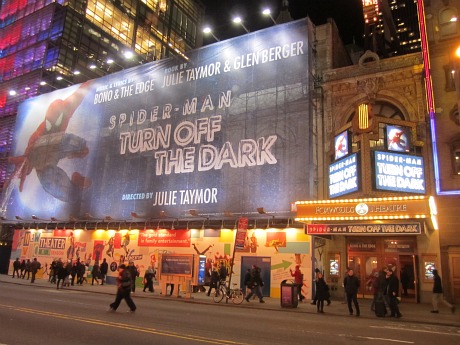
The saddest, costliest, most ambitious, most profoundly disorganized, most accident-prone and most-behind-schedule and in-the-red B’way show in a long, long time. And it won’t open for a while yet.
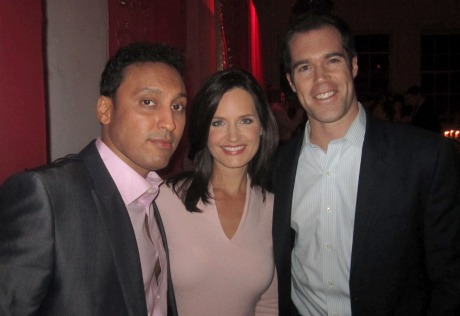
At last night’s after-party for Today’s Special, a somewhat comedic Indian food and ethnic-identity flick that opens on 11.19: (l. to r.) star-coscreenwriter Aasif Mandvi, MSNBC’s Contessa Brewer and Peter Alexander.

 Zebra-like stockings, worn by Paris-residing woman with two Manhattan-residing daughters, taken during Musuem of Modern Art tribute event for Hurt Locker and Triple Frontier director Kathryn Bigelow.
Zebra-like stockings, worn by Paris-residing woman with two Manhattan-residing daughters, taken during Musuem of Modern Art tribute event for Hurt Locker and Triple Frontier director Kathryn Bigelow. Feinberg Explains It All
Those Gurus of Gold Zeligs who recently capitulated to alleged conventional wisdom that The King’s Speech will take the Best Picture Oscar may want to consider a just-posted Scott Feinberg column that offers three reasons why The Social Network will take it instead.
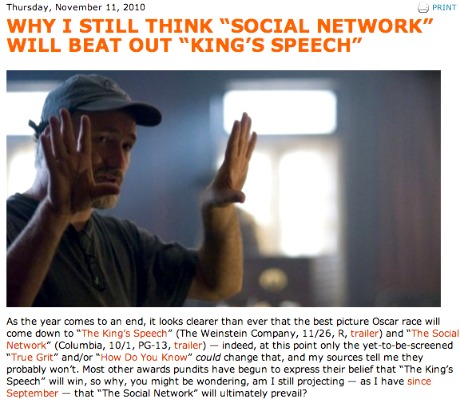
Reason #1, says Feinberg, is that the Academy “has demonstrated a clear preference, of late, for zeitgeist-capturing works (Crash, No Country for Old Men, The Hurt Locker, etc.) over the period-piece dramas that used to be their cup of tea, and The Social Network is clearly more timely/relevant to the world in which we live today than The King’s Speech.”
Reason #2 is that The Social Network “has performed extremely well at the box-office, registered strongly with moviegoers (and Oscar voters) in all demographics, and become an enduring part of our cultural discussion to an extent that I don’t believe The King’s Speech can match.
Reason #3, which Feinberg feels is the most significant, is that The Social Network “has something going for it that The King’s Speech does not — something that has proven to be a deciding factor in numerous other close best picture races: a big-name director, David Fincher, who is overdue-for-recognition from the Academy.”

